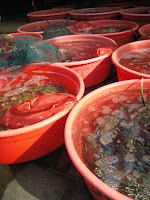I needed to get out of Shanghai. Get away from the crowds, the pollution, the traffic. We headed south to
Xiamen, a coastal city in
Fujian Province, only 100 miles from Taiwan. Our specific destination was
Gulangyu (
Gulang Island), a 2-km-wide island just a ferry ride away from
Xiamen, itself an island.
Xiamen, formerly known as
Amoy, was one of the first Chinese port cities opened to Western and foreign trade.
Gulangyu is where most of the foreigners and their consulates, churches and businesses settled.
We stayed at the
Bayview Inn, a small hotel behind the former British Consulate and current Communist Party office. Over two days we roamed the island's walled alleys, clambered up the boulders and gawked at the run-down mansions that foreigners and rich Chinese had built in the late 1800s and early 1900s. Many tourists visit this island of 15,000 residents but I saw fewer than 15 obviously foreign tourists over the course of two weekend days. Many of the tourists arrive in tour groups led by flag-waving tour guides speaking various Chinese dialects depending on which province the group originates from. Many school groups also visit the island.
What struck me was the rundown nature of the grand old buildings. The islands building boom ended when the Japanese invaded in 1938 and things began falling apart after the Communists kicked all the foreigners out in 1949. China's economic boom still hasn't reached
Gulangyu's infrastructure. Once-beautiful old buildings continue to collapse - many of them vacant and rotting. Others are occupied by multiple families that moved in during the Cultural Revolution. Given the tourism already coming to
Gulangyu it's surprising that more hasn't been done to rehabilitate the old buildings - to at least halt the entropy.

Oddly enough, the one bit of foreign
presence still on the island is a
McDonalds. As a fan of Western breakfasts I was glad of this because the only other dining options on the island seem to be seafood restaurants where the menu is displayed in red plastic tubs on the floor. This was the first
McDonalds I've ever seen that featured dancing girls in
McDonalds uniforms.






